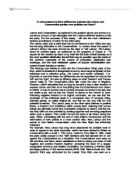To what extent are the major UK parties, internally united over ideas and policies
It’s fair to say that the UK political parties are internally united over policies and over ideas to a certain extent, however I strongly believe that, the extent to which the parties are internally united is roughly about 20% the other 80% I believe it represents the majority of the disagreement within the major parties.
Consensus politics is an overlap of ideological beliefs between parties on some issues, but each party disagrees on how to resolve these issues. Adversary politics is where the parties lie on different ends of the political spectrum, their ideological beliefs contradicts each other completely. These two politics are all based upon the political spectrum (left and right wing.) At this moment in time they followed a pragmatic approach to governing the country, pushing forward their values and theories of how to improve our country. On the other hand, parties nowadays (Labour equaling socialism, and conservatives equaling conservatism) are less pragmatic and they act to what is popular or what is needed at that time. As a result of this it could be argued that the less pragmatic approach is a trigger to the internal disunity within the parties. There are many reasons why there is disunity internally amongst the parties and why there could be unification to a much smaller extent within the parties.
Firstly, the coalition government has introduced a different type of consensus internally and externally amongst the UK parties, however, this unity is only to a small extent. Where policy differences has aroused, the coalition government has used independent commission and forums which has allowed the sensitive issues to be buried or resolved in a neutral process. Such compromise like these has been made with the support from each party towards their party leader. In 2010 the liberal Democrat Vince Cable was going to be dismissed from parliament; however Mr. Cable is a prominent figure within the coalition government for the Liberal Democrats. Externally, how unity has been kept between the two partners takes place in the form of 'the quad' which is meetings where David Cameron and Nick Clegg, bring their closest senior cabinet colleagues (Danny Alexander and George Osborne) to discuss policy differences and compromise. This illustrates to a small extent, the amount of unity internally within the parties and externally amongst the coalition partners.








